Student success in G Research PhD Competition
By sharon.betts, on 16 May 2023

G Research, an industry partner and supporter of our CDT, recently ran a competition for our PhD students, summarising their PhD research field and sharing how their work is both novel and has an impact in its field.
At G-Research we value supporting talent and innovation at institutions world-wide. We were thrilled to sponsor the UCL CDT in Foundational AI PhD prize. The video submission format provided the opportunity for PhD students to present their research in a concise way. We are grateful of the chance we were given to join in on talks and the poster session at Cumberland Lodge. We look forward to repeating the experience next year and meet more of the staff and students. – Dr Charles Martinez, Academic Relations Manager
There were three prize winners overall
1st Jakob Zeitler
2nd Augustine Mavor-Parker
3rd Jake Cunningham
The standard of submission was excellent. All videos were very high quality, interesting and informative and we’re very proud of our students.
The prize is important since it has encouraged students to focus on learning the skills to communicate scientific ideas well and to a broader audience. The entries were also quite creative and we hope that all entrants found this a useful and enjoyable process.
Below is the winning entry video from Jakob Zeitler
We are delighted to that our students are excelling in their field and providing new ideas for the future of AI research.
The CDT wishes to thank G Research for its support.
Presenting to UltraLeap, Reflections on giving talks to Industry Partners by Zak Morgan
By sharon.betts, on 18 January 2023

Zak Morgan is a second year PhD candidate
During an EU Research project meeting, I was invited by one of the industry partners (UltraLeap) to give a talk at their company regarding my PhD project so far. Since it is my first talk aimed at industry specifically I was unsure on what to expect and so here I’ll lay out some of my reflections on the process with the aim of helping those who find themselves in my shoes in the future.
Like in my previous blog post, I’d emphasize that the content you prepare, whether it be a slide deck, poster or other materials, is only the spring board for discussion. Whilst my slide-deck for the formal presentation was 10 slides, I ended up showing many other results and work to aid answering questions in the Q&A afterwards. I’d highly recommend having a collection of supplementary material, like in an academic paper, to aid in answering any questions that might arise from the discussion.
Overall, I found the talk incredibly productive, and I’d like to think both me and the employees found the talk helpful. In particular I can share findings that I am able to carry out due to the nature of my work not being profit-focused, whilst they can provide engineering details and polish on thoughts, that are simply not valued in a research context.
I’d also advise you talk to your supervisors beforehand and the company to make sure you know what they want you to talk about, and what you can talk about. Sometimes this may require signing an NDA if you want to see particularly cool stuff that goes on in industry and not doing so will result in you missing out on a lot of the cool inner-workings at these industrial partners!
On a final note about preparation, if you find yourself in this position, although the talk may only have half an hour, or an hour scheduled, make sure you’re free for a much longer period. A talk over lunch before or with certain people afterwards can be just as productive as the meeting itself!
A massive thanks to UltraLeap for the opportunity, and I’d highly recommend other PhD students to make sure they’re utilising the great connections you can make during your research.
This work was supported by the Royal Academy of Engineering Chairs in Emerging Technology Scheme (CiET1718/14)
CDT Collaboration – Inter CDT Conference at Bristol Hotel with ART-AI and Interactive AI CDTS 7-8 Nov 2022
By sharon.betts, on 29 November 2022
On 7th and 8th November 2022 three of the UKRI CDTs in Artificial Intelligence hosted an Inter-CDT conference for our students and industry partners at The Bristol Hotel. The UKRI CDT in Foundational AI worked alongside our sister CDTs at the University of Bath (ART-AI) and University of Bristol (Interactive AI), to produce a two day event that covered AI from deep tech entrepreneurship to AI Ethics and Defence.
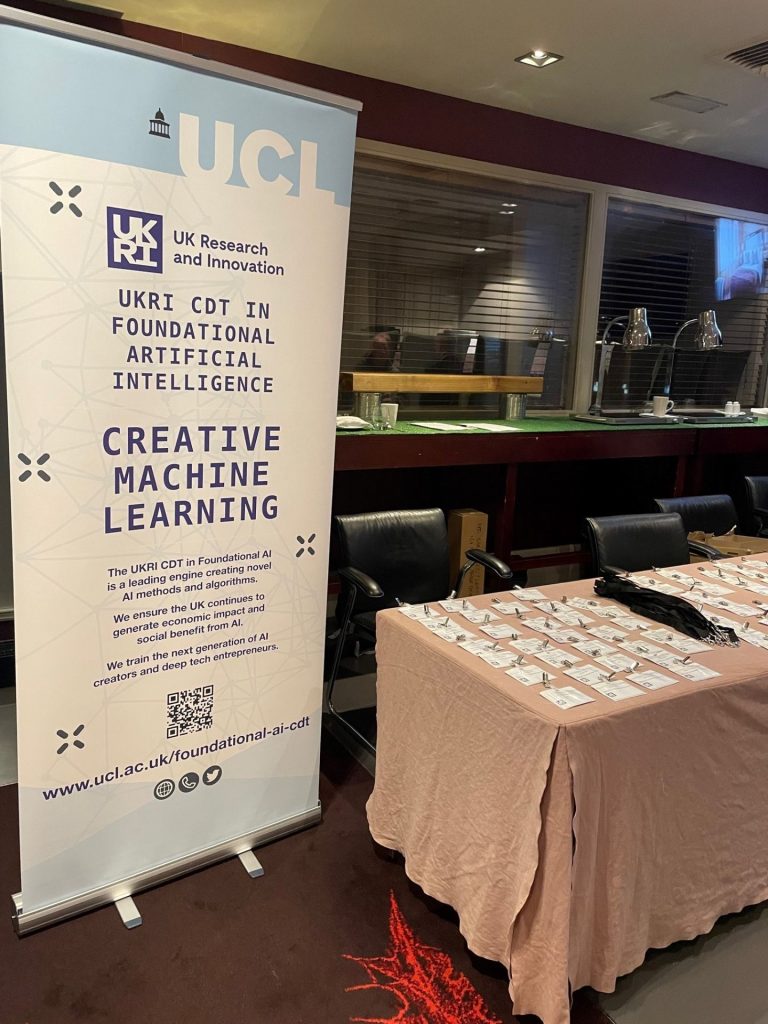
Turnout from all three CDTs was excellent and it was a wonderful opportunity for students across the three institutions to meet and collaborate with one another, sharing their knowledge and research of AI both in theory and applied.
UCL were delighted to host two panel sessions; the first being on Deep Tech entrepreneurship with Dr. Riam Kanso from Conception X, Dr. Stacy-Ann Sinclair from CodeREG and Dr. Thomas Stone from Kintsugi (ad)Ventures. Hosted by our CDT Director, Prof David Barber, this interactive panel session saw our specialists discuss the pathways into start ups and entrepreneurships, the perils, pitfalls and positives that follow! It was wonderful to be able to hear from industry experts their personal journeys to successful business ventures and great to have such an engaged and enquiring audience, who were keen to ask numerous questions and gain further insight to future possibilities.

Our second panel closed the event and was a student-led initiative discussing large scale datasets and massive computational modelling in AI.
For a more detailed review of the event we highly recommend you read the review by ART-AI on their website.

We were delighted to celebrate our student Dennis Hadjivelichkov’s second place in the poster session that took place at the MShed in Bristol as well as enjoy the fine food and fabulous company of our CDT peers.
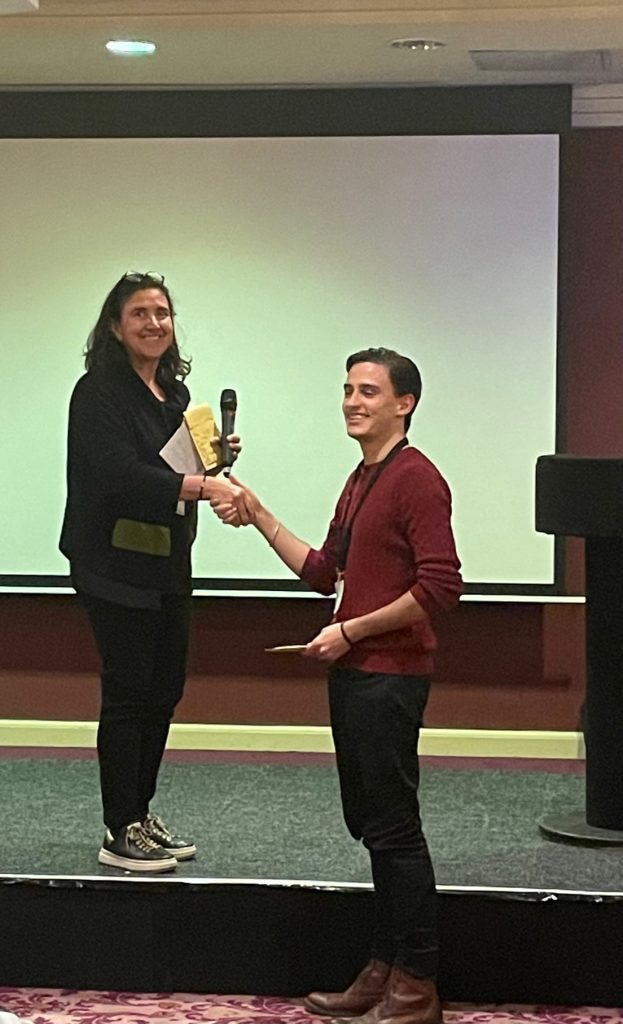
With thanks to ART-AI and Interactive AI CDTs for their co-hosting and co-organising skills. It was a delight to be able to share time and work with our sister CDTs and we hope to collaborate again in the not too distant future.
Conferences and Workshops – GOFCP, MLF & EDS 2022 – Recap of events by Antonin Schrab
By sharon.betts, on 16 November 2022
In September 2022 I had the amazing opportunity to participate in workshops in Rennes and in Sophia Antipolis, and in a doctoral symposium in Alicante!
In poster sessions and talks, I have presented my work on Aggregated Kernel Tests which covers three of my papers. The first one is MMD Aggregated Two-Sample Test where the two-sample problem is considered, in which one has access to samples from two distributions and is interested in detecting whether those come from the same or from different distributions. The second is KSD Aggregated Goodness-of-fit Test in which we consider the goodness-of-fit problem where one is given some samples and is asked whether these come from a given model (with access to its density or score function). In the third one, Efficient Aggregated Kernel Tests using Incomplete U-statistics, we propose computationally efficient tests for the two-sample, goodness-of-fit, and independence problems; this last one consists in detecting dependence between the two components of paired samples. We tackle these three testing problems using kernel-based statistics, in such a setting the performance of these tests is known to heavily depend on the choice of kernels or kernel parameters (i.e. bandwidth parameter). We propose tests which aggregate over a collection of kernels and retain test power, we theoretically prove optimality of our tests under some regularity assumptions, and empirically show that our aggregated tests outperform other state-of-the-art kernel-based tests.
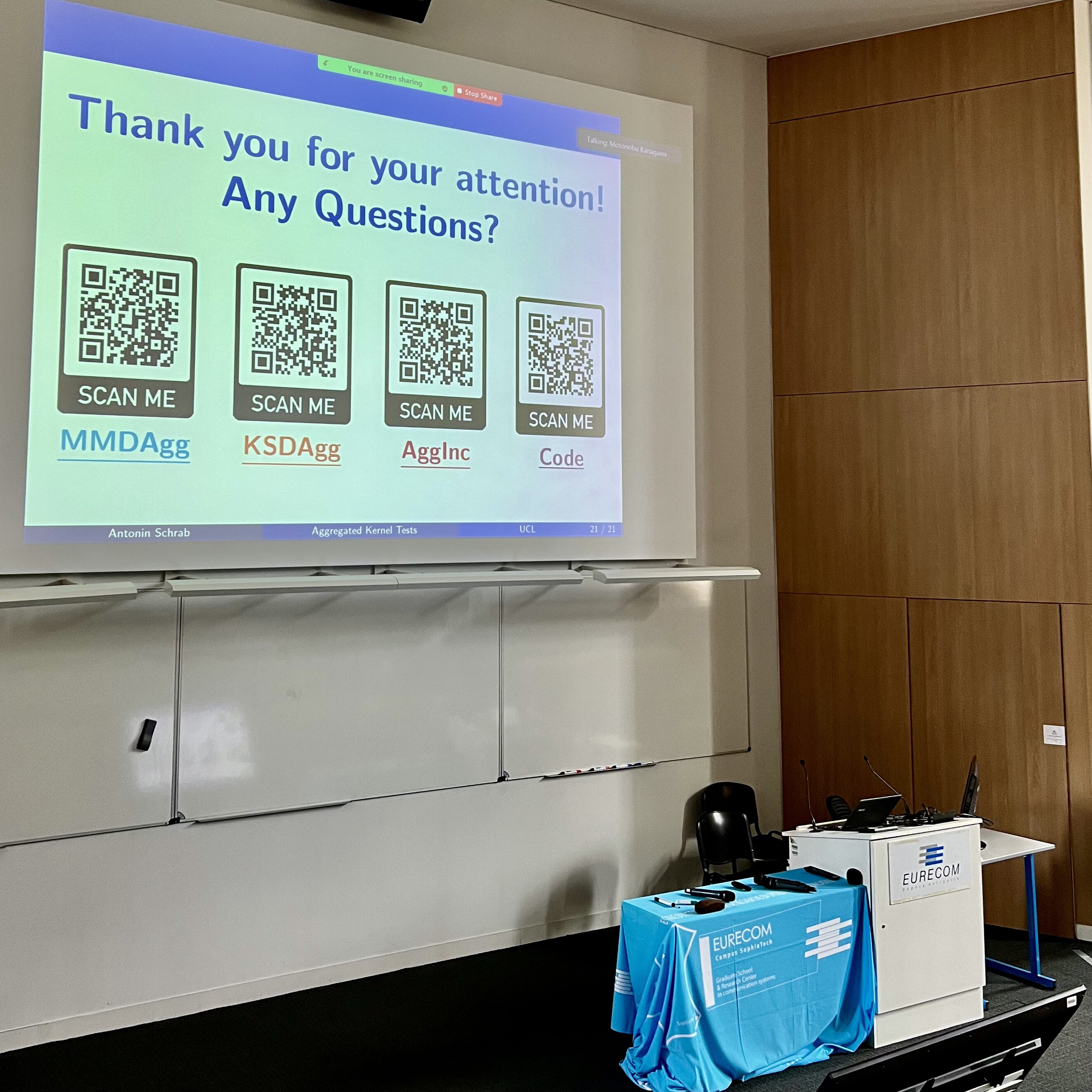
I am extremely grateful to Valentin Patilea, Motonobu Kanagawa and Aditya Gulati for the respective invitations, and to my CDT (UCL CDT in Foundational AI with funding from UKRI) which allowed me to participate in those workshops/symposium!
CDT Students shine at poster showcase event
By sharon.betts, on 4 November 2022
Tuesday 1st November was a busy day at the CDT and UCL Centre for Artificial Intelligence with our joint UKRI CDT poster showcase and AI demo event. Together with the UKRI CDT in AI-Enabled Healthcare we put on an event featuring posters, demos, AI art and robots.
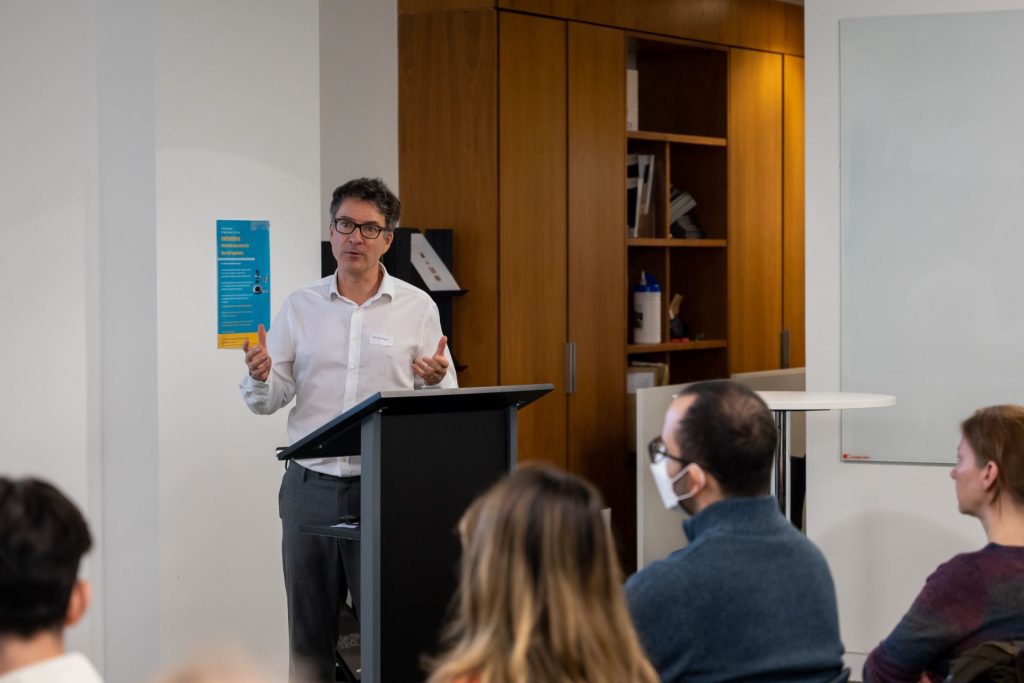
Prof David Barber presenting the latest news on the CDT
The afternoon began with presentations by the CDT centre directors Prof David Barber and Prof Paul Taylor, as well as our industry sponsor Ulrich Paquet from Deepmind. In attendance were students, academics and industry partners, keen to understand what we have been doing and where our research will take us in the future.
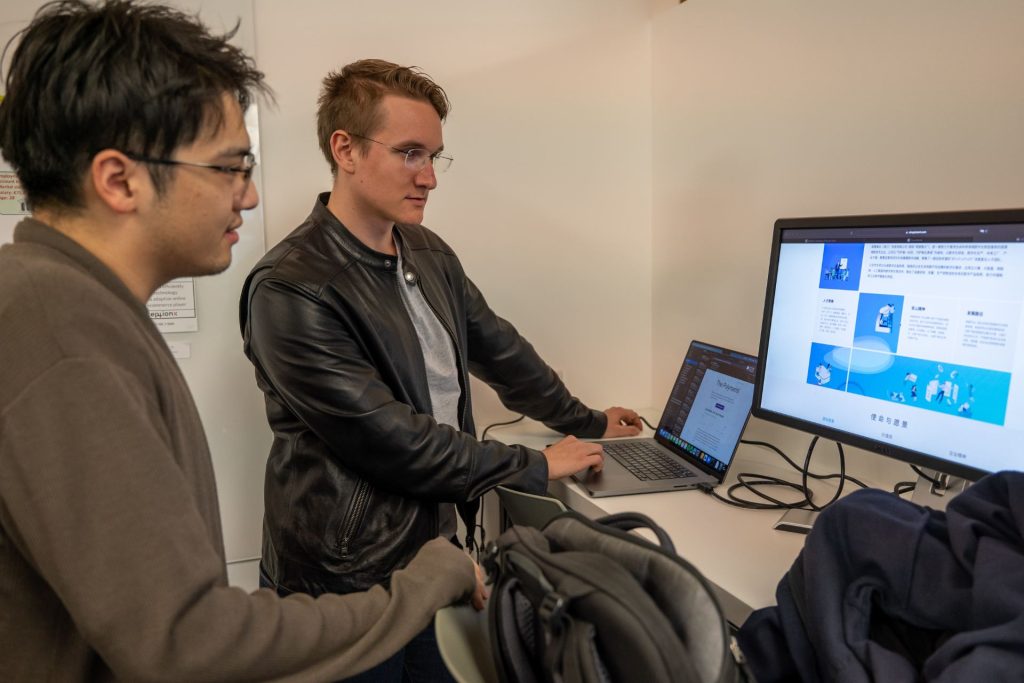
PhD Candidate Jakob Zeitler provides a demo on screen
We had approximately 40 posters on display, with a further 19 demonstrations of AI by a variety of groups from Vision to Natural Language Processing. Engagement with the poster presenters was high across the board and a wonderful opportunity for our students to engage with others about the work that they have undertaken the last few years.
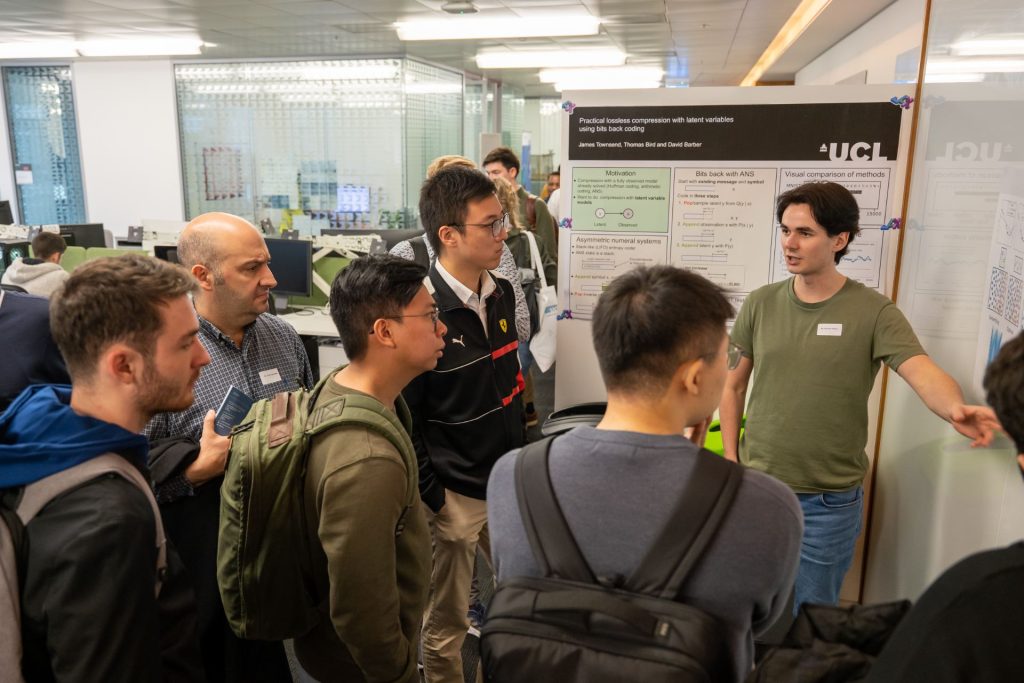
PhD candidate Reuben Adams presents his poster to a crowd of attendees
We were honoured to have the Provost in attendance to witness just how vibrant and stimulating our centres are as part of a dynamic and successful Computer Science department.
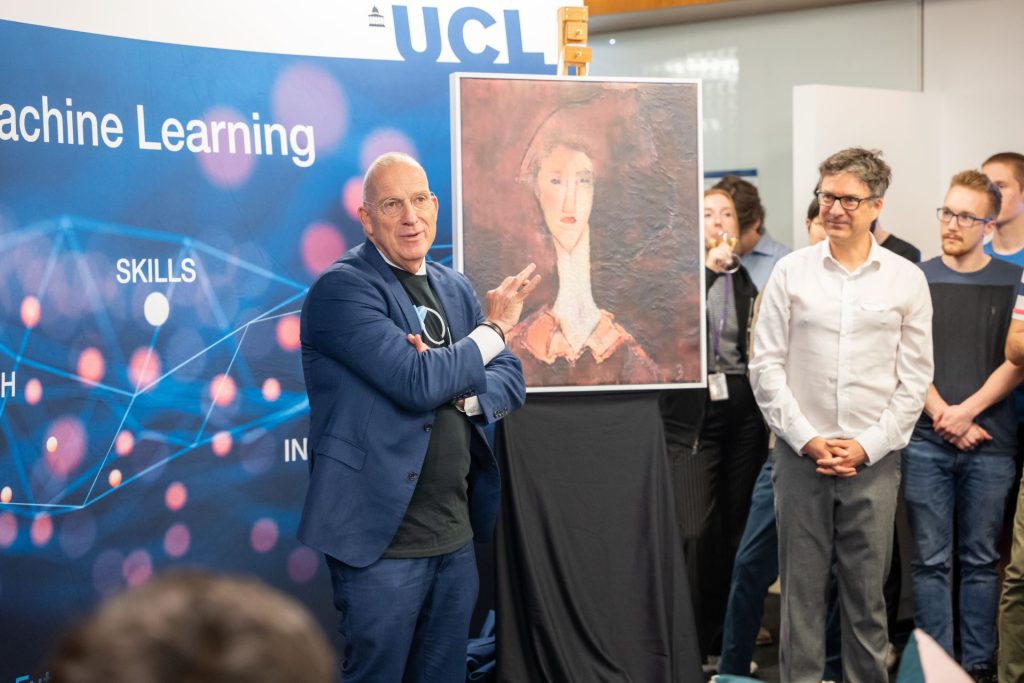
Provost Dr Michael Spence unveils the Amedeo Modigliani painting
The UCL Centre of Artificial Intelligence have been donated a rare 3D generated AI generated painting of a Amedeo Modigliani, which started as a Masters and then PhD project for Dr. Anthony Bouchard and Dr. George Cann and will be displayed at the AI Centre for all to see.
The day ended with a robot display in the Function Space, showcasing the quadrapod robots that our students are working with both at the AI Centre and the soon to be opened UCL East.
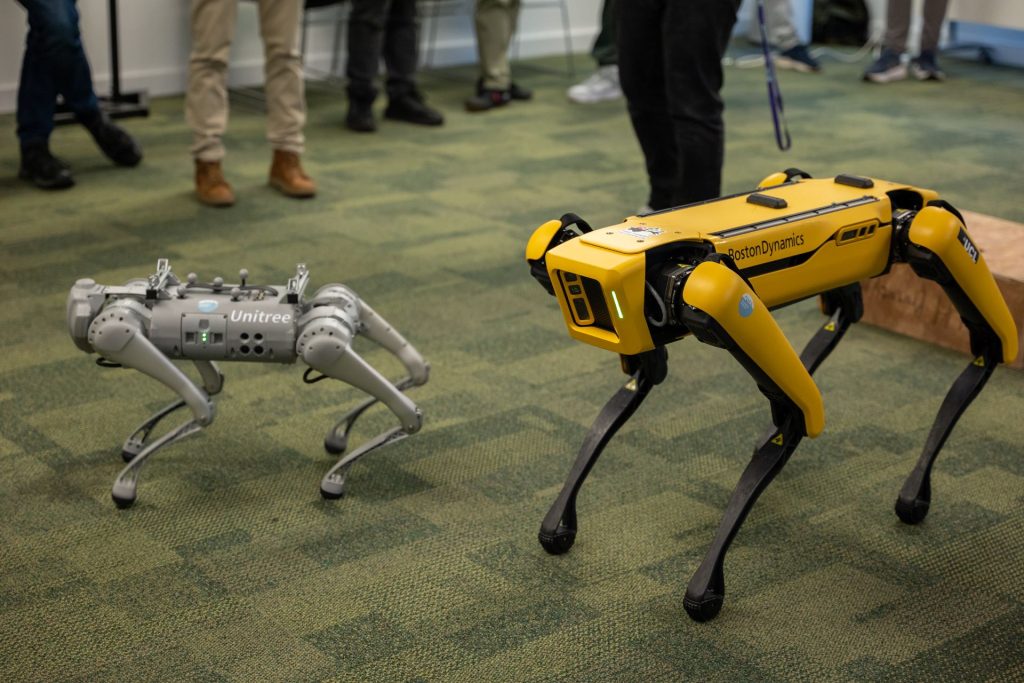
Two quadrapod robots being demonstrated to the crowd
It was wonderful to witness all the different ways in which AI is being applied and developed to help solve some of societies greatest needs and to have the opportunity to share the work of our students with a wider audience.
With thanks to those who attended, our students, director David Barber, AI Centre manager Sarah Bentley and the TSG team for their time, patience and support in helping to make this a hugely successful event.
Conference on Learning Theory COLT 2022 by Antonin Schrab
By sharon.betts, on 14 October 2022

« COLT has been the prime annual meeting of the growing learning theory community for 35 years now, and that London edition has been beyond our expectations. We have been planning COLT 2022 since late 2019, and due to Covid it was unclear until a few weeks before the conference how many people would be able or willing to join. Our optimistic scenario was 150 on site attendees — we ended up at more than 270! COLT 2022 featured the higher number ever of papers (155) in a dual track format. I am especially proud that over 50% of attendees were MSc, PhD and postdocs: COLT has long been a welcoming and inclusive forum for early-career researchers. As local chair, COLT has eaten up a lot of my days and nights recently, but it certainly was worth it! » Benjamin Guedj, Inria and University College London, COLT 2022 Local Chair.
This July, I’ve had the great pleasure of participating in the Conference on Learning Theory COLT 2022 which has been held in person in London! I found the conference to be a real success, it was wonderful to finally be able to meet so many people sharing the same interests in learning theory! It was amazing to follow talks held in the historic Royal Institution of Great Britain which is the location of the famous televised Christmas Lectures!
The conference kicked off with a joint workshop between COLT and IMS (Institute of Mathematical Statistics) Annual Meeting with tutorials and talks by Emmanuel Candès, Nati Srebro and Vladimir Vovk on the topics of conformal prediction and mathematics of deep learning. This workshop allowed to bring together both audience (IMS and COLT) with aligned interests on statistics and learning theory. This was a great initiative which was really appreciated by all the participants I talked to, I hope the joint workshop between IMS and COLT will remain in future editions of the conferences!
During the four following days, all papers accepted to COLT 2022 have been presented by the authors. Each talk was ten minutes long, this format allowed to get a good overview of each of the 155 papers. Topics included Online Learning, Statistics, Privacy, Robustness, Computational Complexity, Deep Learning, Generalization, Bandits, Sampling, Optimization, Graphs, Information Theory, Reinforcement Learning and Control. It was also very interesting to listen to longer talks such as those of the two papers which received the best paper and best student paper awards of COLT 2022 (Efficient Convex Optimization Requires Superlinear Memory by Annie Marsden, Vatsal Sharan, Aaron Sidford, and Gregory Valiant, and New Projection-Free Algorithms for Online Convex Optimization with Adaptive Regret Guarantees by Ben Kretzu and Dan Garber), as well as those given by plenary speakers: Jelani Nelson from Berkeley, University of California, Maryam Fazel from University of Washington, and Alon Orlitsky from University of California San Diego.
I also really enjoyed the open problem sessions in which unsolved problems were presented in the hope that these can be solved in future editions of COLT, it was great to see which learning theory problems people currently find challenging! Other events were also organised such as the LeT-All career panel providing advice to early researchers, the Women in Machine Learning Theory luncheon discussing everyday challenges women are facing in academic and industrial Machine Learning research, the business meeting with COLT announcements about future editions of the conference, the workshop reception and the conference gala dinner which were the perfect opportunity to engage with other participants!
COLT 2022 was made possible thanks to the hard-working organizing committee: program chair Po-Ling Loh from University of Cambridge, program chair Maxim Raginsky from University of Illinois at Urbana-Champaign, local chair Benjamin Guedj from Inria and University College London, local chair Ciara Pike-Burke from Imperial College London, open problems chair Clément Canonne from University of Sydney, online experience chair Claire Vernade from DeepMind, and publication chair Suriya Gunasekar from Microsoft Research. Thank you all for making COLT 2022 possible and such a success!
I am now looking forward to COLT 2023!
Blog: DeepMind/ELLIS CSML Seminar Series 2021/2022 by Antonin Schrab
By sharon.betts, on 3 October 2022

I have been delighted to be in charge of organising the DeepMind/ELLIS CSML Seminar Series 2021/2022 for the second year in a row. The aim of this seminar series is to foster collaboration across different UCL departments of the UCL ELLIS Unit (previously Computational Statistics and Machine Learning, CSML) which include the Gatsby Computational Neuroscience Unit, the Centre for Artificial Intelligence, the Department of Computer Science, the Department of Statistical Science, and the Department of Electronic and Electrical Engineering. Talks topics cover some of the latest research in Machine Learning and Statistics. All information about the seminar series can be found online, recordings are available on YouTube, talks are advertised on Twitter, on a mailing list and on a calendar.
Due to the sanitary situation, we have held our seminars online for the first half of the academic year, this allowed to host international speakers from across the globe. For the second half of the academic year, we were able to resume in-person seminars and to host speakers at UCL. We are immensely grateful to DeepMind for sponsoring our seminar series, allowing us to also host speakers from outside of London. I’d also like to thank all the speakers for presenting their latest work at our seminar series during this 2021/2022 academic year, all talks are presented below. Finally, I’d like to thank Jean Kaddour, Oscar Key, Pierre Glaser and Azhir Mahmood for their help in hosting the seminars, and I am very excited to welcome Kai Teh from the UCL Department of Statistical Science and Mathieu Alain from the UCL Centre for Artificial Intelligence who will join me in co-organising the seminar series for the 2022/2023 academic year!
- Online Multitask Learning with Long-Term Memory
- Contrastive Self-Supervised Learning and Potential Limitations
- Selective Inference with Kernels
- Optimal Subgroup Selection
- Data Augmentation in High Dimensional Low Sample Size Setting using a Geometry-Based Variational Autoencoder
- Sharpness-Aware Minimization (SAM) Current Method and Future Directions
- The Bayesian Learning Rule for Adaptive AI
- Machine Learning without Human Supervision on Neuroscience Signals
- Utilitarian Information Theory
- Lucas-Kanade Reloaded End-to-End Super-Resolution from Raw Image Bursts
- The Blessing and the Curse of the Multiplicative Updates – Discusses Connections between in Evolution and the Multiplicative Updates of Online Learning
- Explaining Kernel Methods With RKHS-SHAP
- Non-Euclidean Matérn Gaussian Processes
- Robust Bayesian Inference for Simulator-Based Models via the MMD Posterior Bootstrap
- Efficient MCMC Sampling with Dimension-Free Convergence Rate using ADMM-type Splitting
- Robust Estimation Via Maximum Mean Discrepancy
- Equivariant and Coordinate Independent Convolutional Networks
- Inference in High-Dimensional Logistic Regression Models with Separated Data
- Causal Foundations for Safe AI
Getting the Most Out of Presenting Your Research to Non-specialists, Reflections on the 2022 UCLIC PhD Showcase By Zak Morgan, PhD Student
By sharon.betts, on 4 July 2022
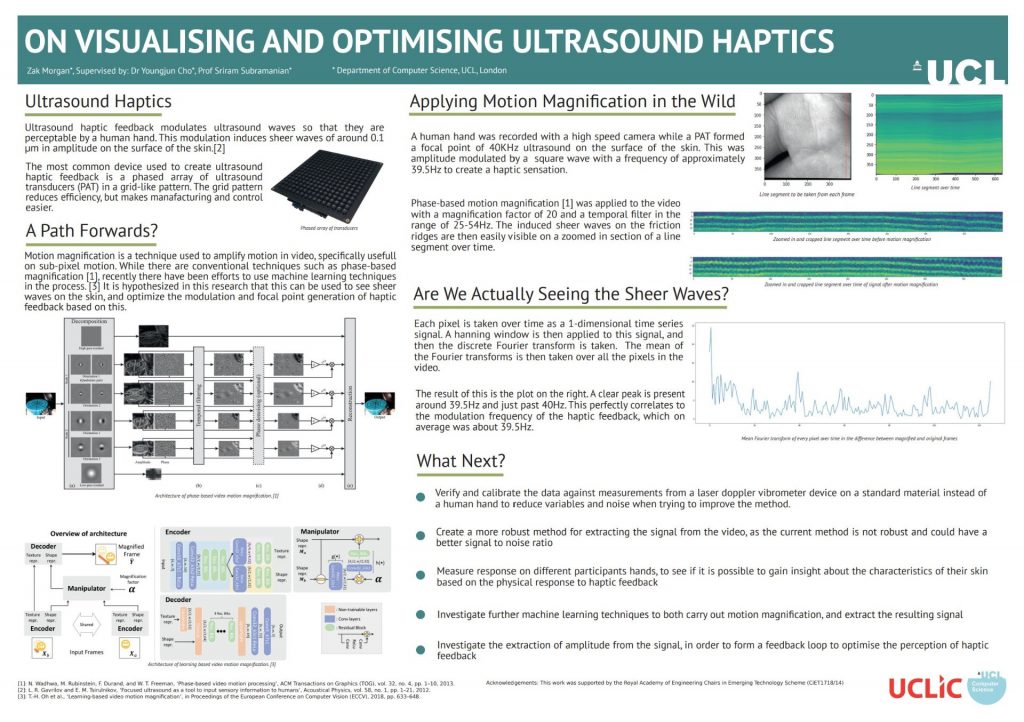
One of the most challenging parts of starting my PhD journey so far, has been adapting my written work from the highly technical works such as academic papers, to a broader audience such as those at multi-disciplinary research conferences. The formal definition of this skill would be in the D domain of the Researcher Development Framework, D2 “Communication and Dissemination” and D3 “Engagement and Impact”.
My first poster presentation was given at Cumberland Lodge, mainly to fellow students in the FAI CDT, but also to other AI focused CDTs around the country. The second referenced here however was to other PhD students and academics in the UCL interaction centre (UCLIC) who are a multi-disciplinary group focused on all avenues of technology and how we interact with it, combining the fields of computer science and psychology.
One of the presentations at the showcase which I found interesting was by Leon Reicherts, who presented his paper “Do Make me Think!”. This is about how to use conversational user interfaces to ask questions to the user, in order to enable “deeper” thinking and more thorough learning to the user. I like to think of this as an interactive version of rubberducking.
I think applying a similar concept to these talks in beneficial. That is that ideally you can inform the audience with sufficient detail about your project in order to have the opportunity to have questions fed back to you at the end which provoke this “deeper thinking”. The difference in audience in these two presentations was crucial in order to perform the first part of this technique correctly.
These presentations have been very beneficial to me in generating new directions for my research, informing me on how well I communicated my research as well as having my peers send me relevant research papers that they see that they think will be useful to me. I can’t stress enough how much this last point has helped me in keeping up to date in my research and in writing my literature reviews, search engines can’t hold a candle to a good network of researchers!
This work was supported by the Royal Academy of Engineering Chairs in Emerging Technology Scheme (CiET1718/14)
The simplest model debiasing approach by Samuel Cohen
By sharon.betts, on 13 June 2022

Machine learning is used in most industries to automate decision processes, e.g., in banking, insurance and HR. Historical data is used to train models, and biases inherent to this data are replicated in the behaviour of the trained models. In this blog post, we look at one of the simplest and intuitive model-centered methods for making the predictions of AI models fairer.
The data

Figure 1: Proportion of low- and high-income males and females in the US census dataset
We are interested in an income prediction task based on real US census data. We can see in Figure 1 that there is a gap of 19% in the proportion of high-income males and female.

Figure 2: Proportion of low- and high-income males and females as predicted by an ML model
When we train a ML model (logistic regression) on this data, and allow it to make decisions on a hold-out dataset, it allocates 18% more high-income predictions to males than females, replicating the unbalanced patterns from the training data.
Our aim is to train a model that will provide balanced high/low-income predictions, while preserving the accuracy (the proportion of correctly classified individuals) as much as possible.
A simple debiasing solution
.png)
Figure 3: Diagram illustrating the simple debiasing solution.
Most machine learning models not only provide binary high/low-income predictions, but also assign probabilities for each option. Typically, we set the threshold for predicting high- or low-income at the 50% level, meaning that if your probability of being high-income is estimated to be over 50%, then we assign a high-income prediction.
In order to force the model to allocate balanced high- and low-income predictions, we can use separate thresholds for males and females. In order to find these thresholds, we first look at the overall number of high-income individuals in the full population — it is of 24%. We hence need to find a separate probability threshold for males and females that will lead to 24% of high-income (predicted) individuals in each group.
.png)
Figure 4: the following thresholds allow both subgroups to have 24% of their members predicted as high-income
First, we begin by training a logistic regression on the training dataset. Second, we use this model to allocate probabilities of being high-income to each individual in the training data. We then find the probability thresholds for males and females such that 24% in each group will be predicted a high-income (see Figure 4).
As can be seen in the figure, females with a 13% probability of having a high-income will be predicted high-income, and males with a 60% probability of having a high-income will be predicted a high-income.
We observe in Figure 5 that after this decision post-processing, we provide as many high-income predictions to each group, and the overall accuracy decreased of 2% only.

Figure 5: By leveraging threshold-corrected income predictions, the model predicts the same proportion of low/high income individuals in each group while losing only 2% accuracy.
Get the code to run this experiment by yourself !
Is AI trustworthy? A discussion on AI and Faith at the UKRI CDT in Foundational AI at UCL Showcase in April 2022 at Cumberland Lodge
By sharon.betts, on 3 May 2022
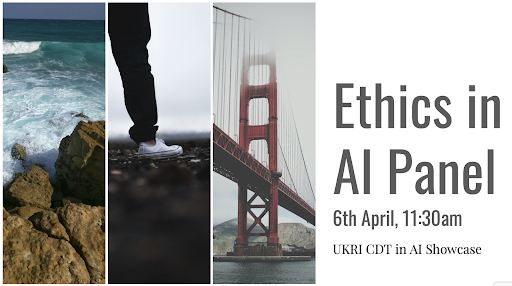
Is AI untrustworthy? Why? How do we build trust in AI? Can AI actually be trustworthy, or only perceived to be so?
Since the beginning of 2021 a group of students in AI and Science and Technology Studies have been running monthly discussion forums at the UCL Centre for Artificial Intelligence (AI Centre) on the big questions of how AI will influence Society, see schedule here. Naturally, most questions are rooted in the morals of the societies we live in.
Recently, we have been looking into how faith and religion influences the trust in our relationship with AI as an individual, but also as a society. We took the chance at the recent Cumberland Lodge showcase of the UKRI CDT in Foundational AI to discuss this trust relationship with the about 100 AI researchers in attendance.
We held a world café-style session, asking the following 6 questions:
- Is AI untrustworthy? Why?
- Will AI be adopted like any other technology e.g. gene editing, steam trains?
- How do we build trust in AI?
- Can AI actually be trustworthy, or only perceived to be so?
- Do you think that faith has a place in a discussion on AI, ethics, and responsibility?
- “AI is helping us to understand God’s world. AI is bringing us closer to God.” Discuss.
These questions were placed in 6 different rooms, and the rules are that you can move between the rooms, but at least 1 person has to be in each room.
We found that there was healthy engagement and debate, with these questions leading to discussions such as – does AI need to be reproducible and open, or does the ability to run test cases negate the need for this? And questions about what it means to consider faith and AI at all (we found that a group of people who identified as atheists were really interested in this topic and the different ways that they could engage). Others discussed whether AI could ever be trustworthy, given that humans use and create AI, and we can’t make a blanket statement that humans are trustworthy. Others opened a discussion about trusting different aspects of AI, for instance, you can trust that deepfakes work well, but also distrust them as a technology as they can impersonate high profile people and try to swing elections.
It was really interesting to hear the interplay between some really technical discussions combined with social elements, and the way that technical solutions vs external (policy) solutions were discussed.
In the coming months, we will continue our discussion on AI and Faith. We hope to use the grant we were given by UCL Grand Challenges to reach out beyond the AI Centre to underrepresented voices in the AI and Ethics discussion whose lives will be affected by AI.
We are also grateful for Tyler Reinmund for joining us on the day. He runs the RTI Student Network, an international and interdisciplinary student-led organisation based at the University of Oxford with the goal of connecting students interested in topics related to responsible research and innovation. They, too, hold monthly reading groups to discuss literature from fields such as artificial intelligence and machine learning, philosophy, law, economics, and the health sciences, and facilitate work-in-progress seminars for research students.
Learn more at https://www.rti.ox.ac.uk/student-network/ or email admin-studentnetwork@cs.ox.ac.uk
If you have more questions or suggestions or are interested in more events like these inside or outside the UCL AI Centre, feel free to get in touch with us.
Jaspreet Jagdev and Jakob Zeitler
Big thanks to Stephen Hughes and Elena Falco whose support made all of this possible, and the whole UCL AI Centre team (Sharon Betts, David Barber, Lopa Murgai) for facilitating these discussions. Thanks also to Adrian Weller at Cambridge for suggesting great directions to explore; we hope to collaborate in future sessions.
 Close
Close

